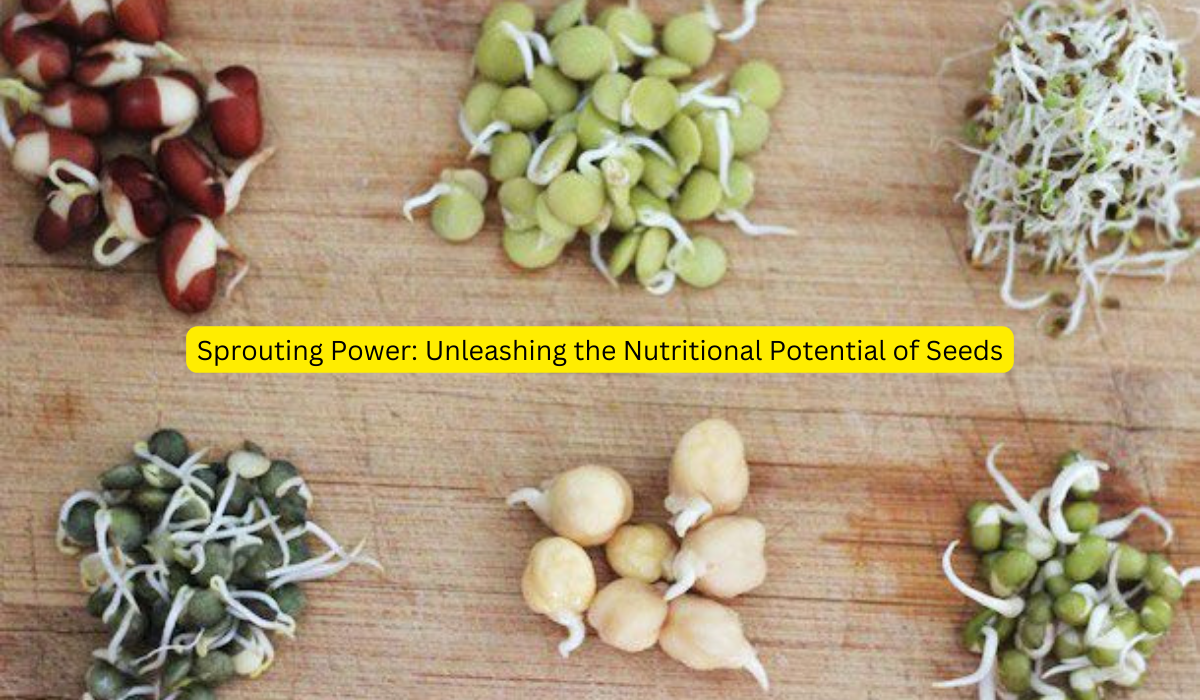Ever wondered why those tiny green sprouts popping up in a jar seem to hold so much fascination? Well, there’s a reason for it! Sprouts, the germinated version of various seeds, are nutritional powerhouses packed with vitamins, minerals, and enzymes, all in a convenient and delicious package. Think of them as tiny nutritional transformers, taking the potential locked within a seed and unleashing a wealth of health benefits. So, ditch the processed snacks and embrace the world of sprouts – a simple yet powerful addition to your diet.
Nature’s Nutrient Boost: How Sprouts Amp Up Your Health
The sprouting process triggers a cascade of beneficial changes within the seed. Here’s how these tiny powerhouses can elevate your well-being:
- Increased Nutrient Availability: Sprouting breaks down complex compounds in seeds, making essential vitamins and minerals like vitamin C, B vitamins, and iron more readily available for your body to absorb. Think of it as unlocking the hidden treasures within the seed.
- Enzymatic Powerhouse: Spouting significantly increases the activity of enzymes, which are like tiny workers that help your body digest food and extract nutrients more efficiently. Imagine them as little helpers in your digestive system.
- Protein Power: Sprouts, especially those from legumes like lentils and chickpeas, are a good source of plant-based protein. This makes them a valuable addition to vegetarian and vegan diets.
By incorporating sprouts into your diet, you can unlock a wealth of readily available nutrients, aid digestion, and potentially boost your protein intake.
Beyond the Basics: A Universe of Sprouts to Explore
The world of sprouts extends far beyond the classic mung bean sprout. Here’s a glimpse into the diverse and delicious options available:
- Alfalfa Sprouts: These mild-flavored sprouts are packed with vitamins A, C, and K, making them a great addition to salads or sandwiches.
- Broccoli Sprouts: Broccoli sprouts boast impressive levels of sulforaphane, a compound with potential health benefits like cancer prevention (more research is needed). Add them to stir-fries or smoothies for a nutritional punch.
- Lentil Sprouts: Rich in protein and fiber, lentil sprouts are a hearty addition to salads, soups, or even lentil burgers.
- Mung Bean Sprouts: These versatile sprouts are a common ingredient in Asian cuisine. They have a slightly sweet and nutty flavor and can be enjoyed raw or cooked.
This is just a taste of the possibilities! Explore different types of sprouts and discover their unique flavors and nutritional profiles to create a vibrant and healthy diet.
Sprouting Your Way to Health: Easy Tips and Tricks
Ready to start sprouting your own little nutritional powerhouses? Here’s a simple guide to get you started:
- Choose Your Seeds: Select organic, non-GMO seeds specifically meant for sprouting. Avoid using seeds treated with pesticides.
- The Sprouting Setup: There are various sprouting methods, but a simple jar with cheesecloth or a dedicated sprouting container works well.
- Rinse and Repeat: Rinse your seeds thoroughly and soak them in water for a designated period depending on the seed type. Then, rinse and drain them regularly to promote even growth.
- Light and Temperature: Most sprouts prefer indirect sunlight and room temperature for optimal growth.
With a little planning and these simple steps, you can enjoy fresh, homegrown sprouts within days.
Safety Considerations: Avoiding Sprouts Gone Wrong
While sprouting is generally safe, there are a few things to keep in mind:
- Food Safety: Always use clean equipment and rinse your sprouts thoroughly to avoid bacterial contamination.
- Spoilage: Discard any moldy or discolored sprouts.
- Raw Consumption: Some sprouts, like alfalfa sprouts, might carry a slight risk of bacterial contamination if consumed raw. Consider lightly cooking them if you have concerns.
By following these safety tips, you can enjoy the benefits of sprouts with confidence.
Conclusion
Sprouts are more than just a trendy health food; they’re a nutritional powerhouse packed with readily available vitamins, minerals, enzymes, and protein. From boosting nutrient absorption to aiding digestion and offering a delicious and versatile dietary addition, sprouts offer a multitude of benefits for your overall health. So, ditch the processed snacks and embrace the power of sprouts – a simple yet effective way to upgrade your diet and unleash a wave of nutritional goodness!
Frequently Asked Questions
1. Are sprouts safe for everyone?
Sprouts are generally safe for most healthy individuals. However, there are a few exceptions:
- Infants and young children: Their digestive systems are still developing, and sprouts might pose a slightly higher risk of bacterial contamination. It’s best to consult a pediatrician before introducing sprouts to their diet.
- People with weakened immune systems: Individuals with compromised immune systems might also be more susceptible to foodborne illness from sprouts. Consult a doctor for personalized advice.
2. Can I sprout any type of seed?
Not all seeds are suitable for sprouting. Here are some things to keep in mind:
- Choose seeds specifically meant for sprouting: These seeds are untreated and safe for consumption.
- Avoid using seeds treated with pesticides: These chemicals can be harmful if consumed.
- Some seeds might not be easily digestible when sprouted: Certain seeds, like apple seeds, contain compounds that can be irritating to the digestive system. Always research the suitability of a seed for sprouting before consuming it.
3. How long does it take to sprout different types of seeds?
The sprouting time varies depending on the seed type. Here’s a general guideline:
- Mung bean sprouts: Ready in 3-5 days.
- Alfalfa sprouts: Ready in 3-4 days.
- Broccoli sprouts: Ready in 5-7 days.
- Lentil sprouts: Ready in 4-6 days.
Always refer to specific instructions for the seed type you’re using for the most accurate sprouting time.
4. Can I store sprouted seeds for later use?
Freshly sprouted seeds are best enjoyed right away. However, you can store them in the refrigerator for a short period (1-2 days) in an airtight container. Remember, sprouted seeds have a shorter shelf life compared to unsprouted seeds.
5. What are some creative ways to incorporate sprouts into my diet?
The possibilities are endless! Here are some ideas to get you started:
- Add them to salads: Sprouts add a delightful crunch and a burst of freshness to salads.
- Top your sandwiches and wraps: Sprouts add a healthy twist to your favorite lunchtime staples.
- Blend them into smoothies: Sprouts can add a subtle nutritional boost and a thicker texture to your smoothies.
- Stir-fry them: Lightly stir-frying some bean sprouts adds a healthy and flavorful element to your stir-fry dishes.
- Garnish soups: A sprinkle of sprouts adds a fresh and vibrant touch to your homemade soups.
With a little creativity, you can easily incorporate the power of sprouts into your daily meals and snacks.

